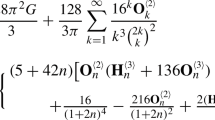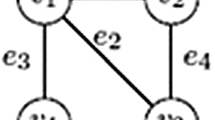Abstract
In this paper, we give sharp upper and lower bounds for the number of degenerate monic (and arbitrary, not necessarily monic) polynomials with integer coefficients of fixed degree \(n \ge 2\) and height bounded by \(H \ge 2\). The polynomial is called degenerate if it has two distinct roots whose quotient is a root of unity. In particular, our bounds imply that non-degenerate linear recurrence sequences can be generated randomly.
Similar content being viewed by others
References
Barroero, F.: Counting algebraic integers of fixed degree and bounded height. Monatsh. Math. (2013). doi:10.1007/s00605-013-0599-6
Barroero, F., Widmer, M.: Counting lattice points and o-minimal structures. Int. Math. Res. Notices (2013). doi:10.1093/imrn/rnt102
Boyd, D.W.: Irreducible polynomials with many roots of maximal modulus. Acta Arith. 68, 85–88 (1994)
Cauchy, A.L.: Exercises de mathématique, 4ème année. De Bure Frères, Paris (1829)
Chela, R.: Reducible polynomials. J. Lond. Math. Soc. 38, 183–188 (1963)
Chern, S., Vaaler, J.D.: The distribution of values of Mahler’s measure. J. Reine Angew. Math. 540, 1–47 (2001)
Cipu, M., Diouf, I., Mignotte, M.: Testing degenerate polynomials. Appl. Alg. Eng. Commun. Comp. 22, 289–300 (2011)
Dörge, K.: Abschätzung der Anzahl der reduziblen polynome. Math. Ann. 160, 59–63 (1965)
Drungilas, P., Dubickas, A.: On subfields of a field generated by two conjugate algebraic numbers. Proc. Edinb. Math. Soc. 47, 119–123 (2004)
Dubickas, A.: Polynomials irreducible by Eisenstein’s criterion. Appl. Alg. Eng. Commun. Comp. 14, 127–132 (2003)
Dubickas, A.: Roots of unity as quotients of two roots of a polynomial. J. Aust. Math. Soc. 92, 137–144 (2012)
Dubickas, A.: On the number of reducible polynomials of bounded naive height. Manuscr. Math. 144, 439–456 (2014)
Dubickas, A., Sha, M.: Counting and testing dominant polynomials. http://arxiv.org/abs/1407.2789 (2014)
Everest, G., van der Poorten, A., Shparlinski, I.E., Ward, T.: Mathematical Surveys and Monographs. Recurrence sequences, vol. 104. American Mathematical Society, Providence (2003)
Ferguson, R.: Irreducible polynomials with many roots of equal modulus. Acta Arith. 78, 221–225 (1997)
Heyman, R.: On the number of polynomials of bounded height that satisfy the Dumas criterion. J. Int. Seq. 17, 1–7, Article 14.2.4 (2014)
Heyman, R., Shparlinski, I.E.: On the number of Eisenstein polynomials of bounded height. Appl. Algebra Eng. Commun. Comp. 24, 149–156 (2013)
Isaacs, I.M.: Quotients which are roots of unity (solution of problem 6523). Am. Math. Mon. 95, 561–62 (1988)
Kuba, G.: On the distribution of reducible polynomials. Math. Slovaca 59, 349–356 (2009)
Masser, D., Vaaler, J.D.: Counting algebraic numbers with large height II. Trans. Am. Math. Soc. 359, 427–445 (2007)
Mignotte, M., Ştefănescu, D.: Polynomials: An Algorithmic Approach. Springer, Singapore (1999)
Schanuel, S.H.: Heights in number fields. Bull. Soc. Math. Fr. 107, 433–449 (1979)
Pólya, G., Szegö, G.: Problems and Theorems in Analysis, vol. II. Springer, Berlin, Heidelberg, New York (1976)
Prasolov, V.V.: Polynomials. Algorithms and computation in mathematics, vol. 11. Springer, Berlin (2010)
Schinzel, A.: Around Pólya’s theorem on the set of prime divisors of a linear recurrence. In: Saradha, N. (ed.) Diophantine Equations, pp. 225–233. Narosa Publishing House, New Dehli (2008)
van der Waerden, B.L.: Die Seltenheit der reduziblen Gleichungen und der Gleichungen mit Affekt. Monatshefte für Matematik Physik 43, 133–147 (1936)
Waldschmidt, M.: Grundlehren der Mathematischen Wissenschaften. Diophantine approximation on linear algebraic groups, vol. 326. Springer, Berlin (2000)
Acknowledgments
The authors would like to thank Igor E. Shparlinski for introducing them into this topic and for providing Proposition 1 which was their starting point, and also for his valuable comments on an early version of this paper. They also want to thank the referee for careful reading and useful comments.
Author information
Authors and Affiliations
Corresponding author
Additional information
Communicated by J. Schoißengeier.
The research of A. Dubickas was supported by the Research Council of Lithuania Grant MIP-068/2013/LSS-110000-740. The research of M. Sha was supported by the Australian Research Council Grant DP130100237.
Rights and permissions
About this article
Cite this article
Dubickas, A., Sha, M. Counting degenerate polynomials of fixed degree and bounded height. Monatsh Math 177, 517–537 (2015). https://doi.org/10.1007/s00605-014-0680-9
Received:
Accepted:
Published:
Issue Date:
DOI: https://doi.org/10.1007/s00605-014-0680-9




